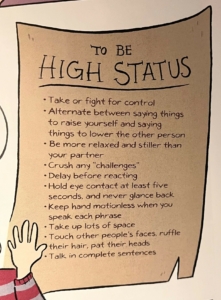With my late diagnosis of ADHD, a lot of things in the past make MUCH more sense. And one thing that really jumps out for me is my love of improv (more on the improv comedy side of things, but improv is a solid catch-all).
Let’s rewind back to 2015: I decide to go to the Tampa Bay Comic Convention. It would be my 3rd con, and just the second since I was 16.

I get a 3 day pass and I’m poring over all the panels((TBCC has an AMAZING selection of panels; they make GalaxyCon look like nothing more than a cashgrab)). I see there’s an improv comedy group, Penguin Knife Fight, performing a couple of shows and I add them to my schedule.
I see they’re also offering improv comedy classes and I immediately feel this ball of fear in the pit of my stomach.
I LOVED the original British Whose Line Is It Anyway? in the 90s. I watched it religiously and laughed my ass off, marveling at their ability to think on their feet, which was NOT one of my strengths.
Not once did it occur to me to try improv, so deeply had I been programmed to consume and not be proactive.((I just realized that it could have been a golden opportunity to change my life, as we lived in NYC at the time and I could easily have found classes and learned more about myself.))
It was the first time that I felt this fear and knew that I HAD TO DO THIS.
I go to the first class and my jitters go away as the team make clear that
- It’s a safe place with no judgement
- Mistake making is expected and encouraged
- if anyone makes a mistake, cheer (the bigger the mistake, the bigger the cheer)
And guess what? Everyone made mistakes, and everyone else cheered them on. It was silly and fun and glorious.
Improv freed my mind from constant overthinking.
If your ADHD/neurodiversity is like mine, there is a constant conversation going in inside your head. It never stops; it just changes subjects as our attention shifts.
Improv stopped the conversation in my head.
I didn’t have to think; in fact, ‘thinking’ was discouraged.
I could just do what my brain does best: react and respond.
Can you imagine not thinking when you’re brain is used to going full speed 24/7? It’s AMAZING.
I enjoyed their games and exercises so much that I went to all 3 of their classes that weekend, connected with some of them on Fb, and tried local meetups until I found one that had more ‘serious’ people in it.((By serious I mean people who were trying their best to improvise and hew to the principles, and not trying to be clever and funny. Principles like listening and being selfless about making your partner(s) look good. It’s not fun to improvise with someone trying to be funny.))
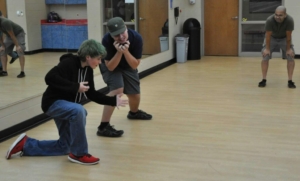
If I may paraphrase Dani Rojas: Improv is life!
Improv also changed me for the better.
I credit improv for some huge changes in me – positive ones that showed that
- being shy((Ye olde school term for social anxiety)) was’t a life sentence
- I could talk in front of people more easily
- I could stop caring about making a fool of myself (without alcohol)
- I didn’t have to attract attention or prove myself in social situations((a result of bullying in grammar school, which I’ll delve into in the future))
- I could communicate better by
- Facing someone and making brief eye contact when speaking to them
- Listening to someone intentionally so I could hear what they were saying((Something none of my schooling had ever taught))
- I could think on my feet, much much better than I thought I could
- Bonus: I became a lot better at arguing 😆((Later I taught a homeschool debate class and got even better at arguing 🤣🤣🤣))
Improv was legit life-changing for me.
I’m a better person because of it, which is why I recommend that everyone – especially people with ADHD and/or social anxiety – try it.
I almost forgot – this is a book recommendation post 😆
Is there anything more ADHD than spending most of a book recommendation post with a super long setup (which is naturally required for complete understanding of the matter)?
I ordered Alex Graudin’s Improve: How I Discovered Improv and Conquered Social Anxiety from the library the second I heard about it. I was damn curious to see if someone else experienced some of the same things I did – but she went even deeper to the point where 1) I need to own this book and 2) I need my kids to read it.
tl;dr: If you have ADHD or social anxiety, READ THIS BOOK
And she grabbed me from the get go with this panel:
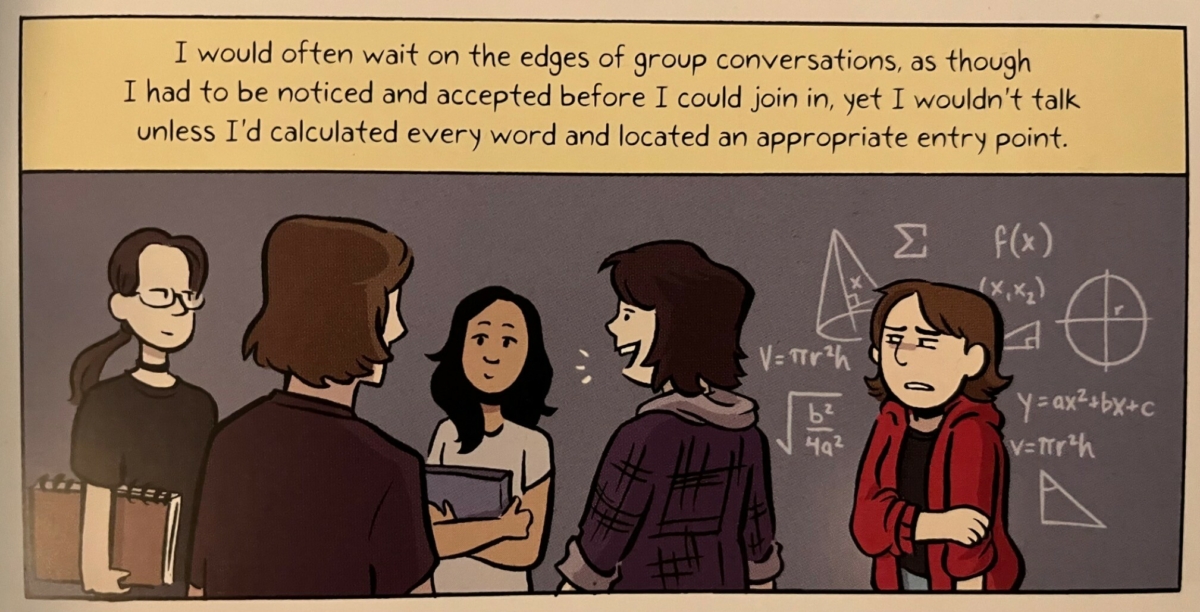
I have been in that situation COUNTLESS TIMES IN MY LIFE. Waiting to be noticed and rehearsing what I would say (while hoping that the topic didn’t change before I got my chance to speak).
Adding to my stress is my inability to know when is the right time to speak, since I miss subtle social cues.((Someone is going to clue me in on what these cues are eventually, right? Hello?))
Alex’s observations hit home time and time again.
The big thing, besides the way she captures her memories and feelings, is that she has an excellent grasp of the medium. I like to say that anyone can make comics, but not everyone can do it well. Alex is exceptionally good at it.
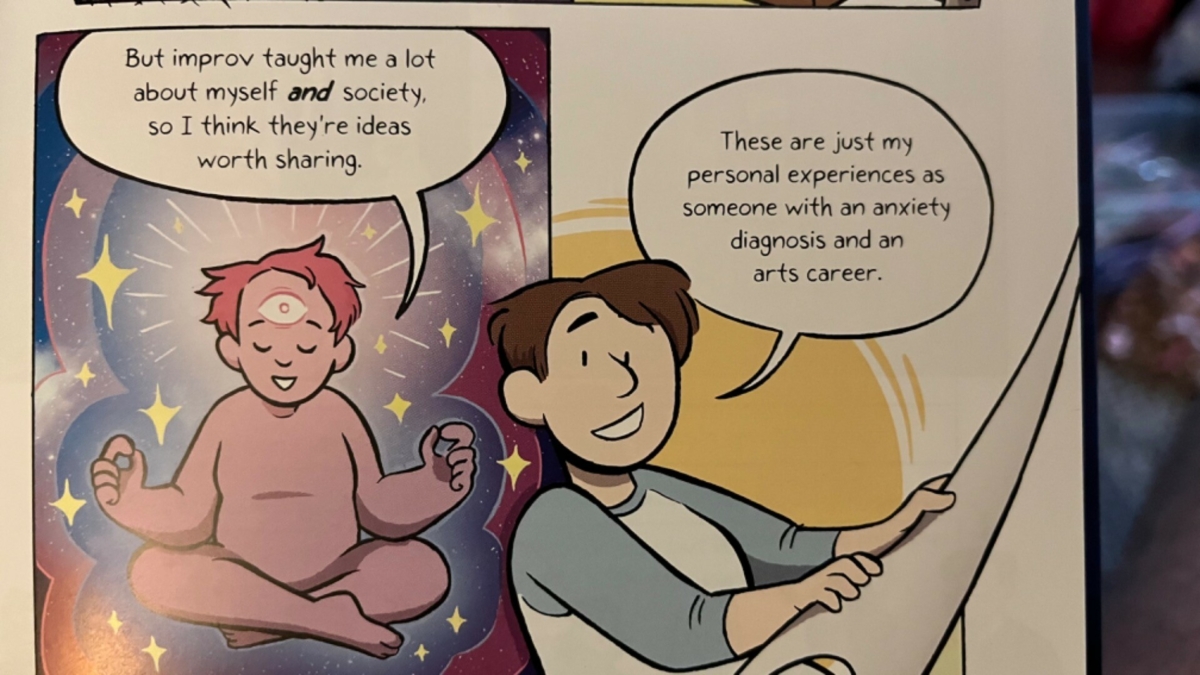
I’ve never been diagnosed with anxiety but as I mentioned before, I was a ‘shy’ kid. My anxiety was so internalized that I didn’t realize I even had it until 2020. Her personal experiences deeply resonated with mine – and opened my eyes to some things I hadn’t been aware of before.
This book showed how my ADHD influenced behaviors worked against me socially.
Take a look at the To Be High Status list to the right (click it to embiggen).
Does it remind you of someone you know or have met?
We worked in my improv classes on establishing a power structure in a scene – who’s in charge, who’s not – using body language, how we spoke, what we said, et al. But Alex’s classes went deeper – and seeing this list made me realize that my adhd influenced behaviors worked against me, like:
- Being more relaxed & still: I need to fidget & move my legs a lot
- Delay before reacting: I’m impulsive & immediately reactive
- Hold eye contact for at least 5s: LOLLOOLLOLOLOLL((I’ve gotten better at it but I still don’t love extended eye contact.))
I don’t think anyone who spent extended time with me took me seriously unless I was talking about stuff I knew well. Starting in college a lot of people took me as a joke – coworkers, (former) friends, etc.
Now it made sense 😔.((Also: I still hold it against all those judgmental fucks.))
And here’s the one panel that hit me the hardest.
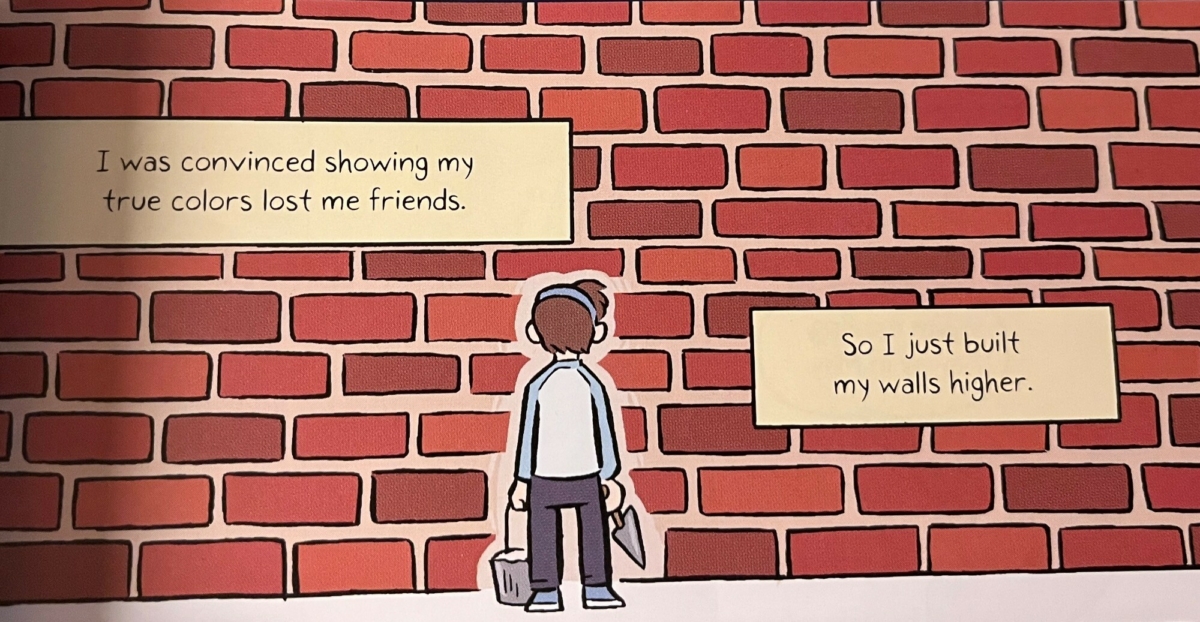
Oversharing is something we ADHDers are prone to, and I’m no exception. I’ve concluded that some people seem to like me is because oversharing can come across as disarmingly honest and funny, and more interesting than a more restrained response.
But there have been a few times where I got a little too comfortable, opened up a little too much, and someone reacted negatively((Yes, I still remember each person as my Shit List is written in permanent marker)), which led to the walls being rebuilt (except higher and sturdier this time).
And the shitty part is that I’m hella guarded to begin with.
On the bright side((I’m an inveterate optimist 🤷🏽♂️)), I learned in these experiences which people are worth my time and energy – and to vet people carefully.
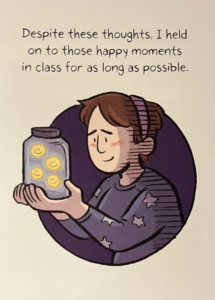
If you have ADHD or social anxiety, READ THIS BOOK
You will find a LOT to relate to, and maybe it’ll convince you to get out of your comfort zone and give improv a shot. The results can be life-changing.
I close by sharing this last panel to the right, which warms the comic craft geek in me.
This visual is the kind of magic that is only possible with comics.
The simple, powerful, instantaneous communication of thoughts and feelings. Comics are a beautiful and potent medium.
